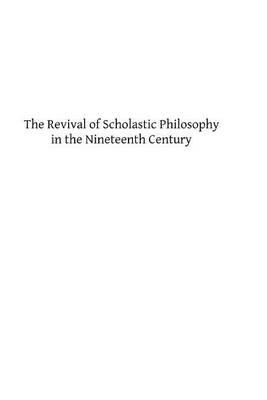Overview
The author begins: The present work consists of two parts, the first of which may be described as definitional; the second, as historical. The first part is not intended to be a complete course of Scholastic philosophy. I limit myself to an exposition and a discussion of those principles of Scholasticism, a knowledge of which is indispensable to an understanding of the Scholastic revival. For an adequate knowledge of Scholastic philosophy, I would refer my readers to the masterly expositions of Urraburu, Mercier, and the Jesuits of Stonyhurst. The shorter treatises of Ginebra and Pecsi are also excellent. In the historical part, I have divided the speculative world into races rather than into political divisions. I have thus included German Austria in the chapter on Germany and devoted a separate section to Hungary. I have likewise studied South American republics in connection with the neo-Scholastic movement in Spain. It is into races, rather than into arbitrary tracts of land, that the world is divided. In spite of the ridiculous principle we call the Monroe doctrine, South American nations are and will always be essentially Spanish. With Spain they speak, they think and they pray. They regard us as strangers, sometimes as barbarians. They emphatically refuse to accept the protection we would force upon them. Scholasticism is bound up with Catholic doctrine and Catholic thinking. Those opposing scholasticism have often been condemned. The greater number of modern philosophical systems have been condemned by Catholic theologians as opposed to revealed truth, and many among the leaders of modern thought have seen their works placed on the Index Librorum Prohibitorum. We find in the Index the names of Descartes, Malebranche, Locke, Condillac, Hume, Kant, Rosmini, etc. Let us consider this about the anti-scholastics: It is as a philosophical system, however, that Mr. Carrasquilla studies liberalism, which he refutes by the Thomistic social principles. Liberalism, says he, is above all a philosophical school, which a priest may study and refute with the same right wherewith he would combat Descartes, Hegel or Rosmini. Let us consider this: As regards the other property of truth, its immutability, St. Thomas teaches that truth considered in things is immutable in so far as the essential characteristics are concerned, and mutable only in the accidental elements. Truth, considered with regard to our mind, is essentially immutable and accidentally mutable. It is mutable only in the sense that our mind may pass from error to truth. It is essentially immutable, because it is regulated by the truth of things, which is immutable. With regard to the Divine Mind, truth is essentially one and immutable.
Full Product Details
Author: Brother Hermenegild Tosf ,
Joseph Louis Perrier Phd
Publisher: Createspace Independent Publishing Platform
Imprint: Createspace Independent Publishing Platform
Dimensions:
Width: 15.20cm
, Height: 1.90cm
, Length: 22.90cm
Weight: 0.472kg
ISBN: 9781484924822
ISBN 10: 1484924827
Pages: 352
Publication Date: 09 May 2013
Audience:
General/trade
,
General
Format: Paperback
Publisher's Status: Active
Availability: Available To Order

We have confirmation that this item is in stock with the supplier. It will be ordered in for you and dispatched immediately.



